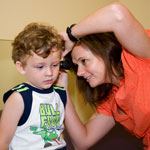It’s back-to-school season again, which means making new friends and adjusting to a different class environment. Whether your child is moving up with the same group of friends, joining a brand new class, or transferring schools this year, making friends can be difficult.
To effectively help your child make friends at school requires a bit of knowledge about how children socialize, their interpersonal skills, and how children control emotions.
Be Your Child’s Emotion Coach
Children often succumb to outbursts of emotion, whether they are ecstatically happy or inconsolably sad. To make friends, parents must teach children strategies for keeping these emotions under control. When you talk to your child about feelings in a sympathetic way with the goal of solving a problem, it teaches control over those emotions and leads the child to express those feelings in an appropriate manner.
Understand Your Child’s Friendship Style
Often, parents impose their own socialization habits onto their children. However, assuming your child makes friends the same way you do can limit your child’s abilities. Observe what type of social interactions and friendship styles work best for your child and tailor your efforts accordingly. If your child loves a group setting, for example, the classroom probably won’t feel daunting. However, if your child prefers to meet others one or two at a time, invite classmates over for individual playdates until your child feels comfortable with a new group.
Build Social Skills
Social challenges can be the greatest inhibitors when a child tries to make new friends. If your child struggles to interact with others, help by role-playing and practicing social behaviors together. Be a model of proper social skills by demonstrating appropriate social behavior when talking to your own friends. Consider using social scripts to start your child off on the right foot. Giving your child a few pointers and conversation starters can help get the ball rolling with a new group of friends.
Be There for Your Child
Above all, be there for your child this year as he or she makes new friends, leaves old friends behind, and finds a place in a new classroom setting. Talk to your child each day about school activities, lessons, and interactions with other students and listen closely for signs of bullying or unhappiness. Encourage your child’s independence and ability to solve problems by providing them with the right social tools for success. With your support, your child will make friends in no time.
The information and content on our website should not be used as a substitute for medical treatment or advice from your doctor.

